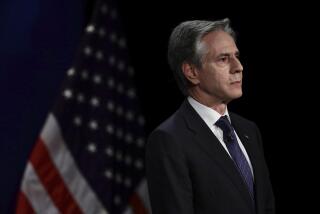U.S. Diplomat Tries to Cool Down Russian-Georgian Dispute
- Share via
MOSCOW — A senior U.S. official on Friday sought to head off armed confrontation between Russia and Georgia, disputing Moscow’s claim that it has the same right to preemptive action to halt Chechen militants that Washington asserts with regard to Iraqi President Saddam Hussein.
“I think it is a question of prudence and judgment, and particularly when the factual circumstances are so different as in the situations in Georgia and Iraq,” Undersecretary of State John R. Bolton said at a news conference here.
Russian President Vladimir V. Putin threatened Wednesday to send Russian forces into Georgia to attack Chechen guerrillas and other militants who are taking refuge there and staging cross-border incursions into Russia. Moscow contends that Georgian officials have done too little to contain--and in some cases have actively supported--the rebels.
Putin sent an ominous message to the U.N. General Assembly on Thursday, saying Russia was preparing military strikes at Georgian territory.
Russian analysts have speculated in recent days that Washington secretly has agreed to turn a blind eye toward any Russian intervention in Georgia in exchange for tacit support of possible U.S. military action against Iraq.
But Bolton, at the conclusion of three days of talks with Russian security officials, denied any such deal had been reached and pointed out a State Department statement publicly warning Moscow against violating Georgian sovereignty.
Bolton professed confidence that Russia and the United States will find common ground on the issue of Iraq, which the Bush administration maintains is developing weapons of mass destruction. He said that Hussein’s defiance of United Nations resolutions requiring weapons inspections shows contempt for the Security Council, whose five permanent members include Russia and the United States.
“I think that this affront to the authority of the Security Council is too serious to be the subject of quid pro quo deals,” Bolton said of rumored economic and military trade-offs. “I don’t think that’s expected on the Russian side or the American side.”
Further talks between U.S. and Russian officials are expected next week in Washington, when the two sides are scheduled to convene the first session of their joint Consultative Group for Strategic Security.
Georgian President Eduard A. Shevardnadze has acknowledged the presence of foreign extremists in his country’s remote and rugged Pankisi Gorge but insists his troops are conducting their own sweeps to drive out the intruders. On Thursday night, Georgian police were fired on when they intercepted armed militants in the gorge. A Chechen gunman was wounded and captured in the shootout, but at least two others managed to flee, authorities said.
In Tbilisi, the Georgian capital, Shevardnadze said he had sent a letter to Putin about the Russian threat, though he declined to disclose specifics. The former Soviet foreign minister also expressed his gratitude to U.S. officials who reacted immediately to Putin’s bellicose statements with words of caution and unfettered support for Georgia.
“Following Putin’s statement, I was confident that the U.S. response would be tough, principled and in defense of Georgia’s rights,” Shevardnadze said.
Other Georgian officials also raised objections to Putin’s statements.
Russian authorities, however, continued to press for action to contain the Pankisi-based militants, claiming fresh proof of terrorist preparations there.
In Rostov-on-Don, headquarters for Russia’s southern judicial district, Deputy Prosecutor Sergei Fridinsky told reporters that his office has obtained evidence that at least four terrorist training bases are operating in the Pankisi region.
The bases are used to train militants, including foreign mercenaries, in demolition activities and in handling weaponry, Fridinsky said. He also contended that the militants are supported by some Georgian authorities, “including customs officials, border guards and the military.”
U.S. Army trainers have been in Georgia since spring to help government forces learn counter-terrorism tactics.
More to Read
Sign up for Essential California
The most important California stories and recommendations in your inbox every morning.
You may occasionally receive promotional content from the Los Angeles Times.











